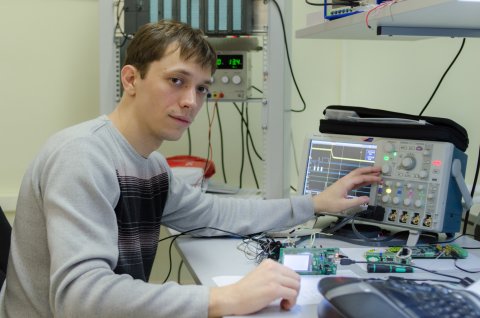Vladimir Sinitsin, leader of the project group works in the SUSU’s laboratory of technical diagnostics, and the project’s idea came up as a result of discussing technological problem with the representatives of nuclear industry. It turned out that the problem with control of accuracy of the temperature sensors has not been solved yet, and the laboratory staff started research in this field. Their work resulted in creation of a device capable of promptly registering errors in temperature measurement and report failures since inaccuracies in temperature conditions can lead to defects in the whole batch of goods.
“Any temperature sensor may become inaccurate with time, and if temperature accuracy is critical for a technological process, this may affect the quality of the produced goods,” shares the leader of ST-TR Project Vladimir Sinitsin. – “Regular replacement and inspection of temperature sensors may not always prevent sensors from losing their accuracy. If that happens, a production may start producing faulty goods.”
The ST-TR team has been working on the project since 2016, and in 2017 presented a prototype of a head transmitter. And already early in 2018 the project teams was chosen to participate in GenerationS Technological Start-ups Accelerator by RVC.
As a result of working with the experts of UEC Saturn engine-building company and other productions of the Yaroslavl Region within the frameworks of the start-up accelerator, ST-TR team reviewed its project and suggested a solution that a sensor could form a “failure” signal in case of troubles. According to the project’s author, they had to make the device more utilitarian by removing part of its functions (such as wireless communication), and thus, shorten its development deadlines.
“This is called a method of controlled actuation. By the sensor’s response to actuation I assess its status and determine how accurate are the sensor’s readings. Our system can perform regular self-testing, and when a sensor fails, the system produces a signal on the production shutdown. The convenience of using our sensors is that it is possible to replace only the electronic module (compatible with the current system), and not the whole structure, what reduces the cost of production re-equipment,” says Vladimir.
“The TechNet GenerationS accelerator experience changed my attitude with regard to business and industry, since before I only dealt with the project’s technological task. Back then we didn’t ask ourselves the question on who needed exactly what, and what was the value of what I was doing in the context of entrepreneurship. We changed our view of the project in over a week! The Accelerator helped us reject one not promising idea. We talked to investors and experts of UEC Saturn, who explained us what industry needs today, and how we should work with enterprises,” notes Vladimir Sinitsin.
According to Vladimir, UEC Saturn may be interested in implementing the ST-TR head transmitters, since the technological cycle of producing an engine blade, for instance, includes many temperature-control-critical operations. By 2019 the developers are planning to release a pilot series of their product. The ST-TR sensor will cost approximately 3 thous. roubles per one item.




